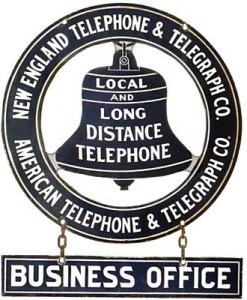
Clear made itself unclear about its speed throttle.
Clear, the 4G wireless broadband service backed by Sprint, Comcast, and Time Warner Cable is under fire for selling customers an unlimited use/”no speed limit” service plan that is heavily throttled to as low as 250kbps once customers are deemed “heavy users” by the provider.
Stop the Cap! reader Kevin in Rochester dropped us a note to share his frustration at Clear’s bait and switch marketing that promises one thing and delivers another.
It’s becoming common knowledge – but not common enough – that Clear is throttling their in-home broadband subscribers. For $30 a month, Clear delivers “unlimited 3Mbps” download speed, but after 8-10GB of usage in a month, they cut your speed to 250kbps as a punishment.
Scores of customers share Kevin’s problems, with complaints pouring in on broadband forums and on Clear’s customer support website (which crashed earlier today). It is not known whether these usage limitations are also imposed on Comcast and Time Warner Cable’s branded 4G wireless services, which are also delivered by Clear’s network.
Remarkably, Clear’s website has marketed its broadband service as free from classic Internet Overcharging schemes like usage caps and speed throttles/network management:

Clear's own marketing promises unlimited usage with no speed reductions, unlike those "other" providers, which now also includes Clear itself. (Courtesy: Michael46)
Despite the marketing, Clear’s Rob Lenderman today admitted the company implemented a speed throttle system on Wednesday, Sept. 29 and placed the blame for doing so on peer-to-peer torrent traffic:
Last Wednesday we deployed a new automated algorithm that tries to even the playing field for all users. Essentially we tried to take users that were downloading large amounts of data over a week’s period of time and limit their top speeds during periods of high tower utilization. This system is based on a tower’s current utilization, GB’s downloaded in the past 7 days and current download speeds in the past 15 minutes. it recalculates your max D/L speed every 15 minutes based on these factors. All in there are 48 buckets of max D/L speeds based on these factors.
The expected results of these changes was that a small percentage of users would be slowed down for short periods of time but only during high utilization times on the tower.
Theoretically the very slow speeds would only last for 15 minutes and then readjust based on tower usage and the last 15 minutes of slower speeds.
The reality is that a very small percentage of users are being set at very low D/L speeds for hours at a time.
We are gathering more data as I write this and we are looking at adjustments to the policy so that the connection becomes more usable. Expect further details this week.
One thing I want to stress is that this algorithm does not apply to towers that have a low utilization which is a large percentage of the towers. Since high utilization is usually at night most users that are seeing slower speeds at night would see increases at other times of the day. We realize this is not ideal but using the system for large downloads outside normal usage hours(evening) will allow you to get higher speeds. This rule applies even if you are not being slowed. Fewer users = Higher speeds.
Expect more details in the next few days as we drill into the details and let you know what changes we will be making to make the experience better.
In the short term you can increase the speeds of your experience by reducing the number of GB sized downloads that take place. Our data shows that running a torrent is one of the reasons that people start to experience slower speeds.
[…]I use the word limit when talking about D/L speeds. Not in terms of amount of data you can download. I can assure you this is being handled at a very high level in the organization as some of the experiences some of you are having is not in the spirit of the program. As for using a P2P you will improve speeds if you run them at off peak hours. As tower utilization drops during those hours the algorithm will release more bandwidth and the apps will pick up speed. In addition fewer users will also yield an increase since the algorithm does not affect low utilization tower at all. So you get a double benefit from using off peak hours for large downloads.
We are looking at how to set the speed limits to ensure things like web browsing and youtube are useful even though large downloads may be limited in terms of speed during peak hours.
We are meeting every day to go over new data and determine a longer term solution instead of just throwing new solutions out there without putting some thought into them.
We apologize for this but we need to get it right and not just change for the sake of change.
RobL
Of course, customers promised repeatedly they would receive lightning-fast, unlimited wireless broadband from the company were unimpressed with the company’s argument that artificially slowing their speeds after as little as 20 minutes viewing Hulu or Netflix to 250kbps for several days qualified as ensuring the subscriber experience. Many customers report Clear’s throttling is hardly limited only to peer to peer torrent traffic. Online video streaming, in particular, routinely triggers the speed throttle for customers, something Lenderman admitted might be an issue:
We are looking at the impact of the new policy as we speak and will be reevaluating it shortly to determine what changes might need to be made.
The algorithm we use is complicated and is not intended to shut down users that use the service in a normal manner. It was intended to slow down usage from users that have bit torrents, etc running all day long.
For some of the customers that have complained we have researched it in detail and they were not being slowed by the algorithm. We have to make sure that everything is running properly as it makes no sense for us to limit users so much that the service becomes unusable.
We should have more info on what we plan to change in the next few days as we evaluate the data.
Clear becomes just the latest provider poster child for Net Neutrality in the United States. While there may be reasonable capacity issues at stake on wireless networks not designed to accommodate 24/7 peer to peer traffic, throttling online video is another matter entirely — it’s one of the services Clear has promoted as possible using their higher speed network. Artificially slowing a network the company sells as not being hampered by such traffic control measures is a classic case of false advertising.

One vocal Clear customer created this avatar
Customers have noticed and have attacked the company for dishonest business practices, bait and switch marketing, and violating their own internal policies.
Stop the Cap! has not seen any reports of company officials attempting to enforce early termination fees for those exiting contracts early. Kevin noted his service was turned off as he was on the phone with a representative to process the disconnect request. The representative also demanded Kevin return his modem.
Most who are dropping service are resuming service with their old providers, mostly cable broadband and telephone company DSL providers. If online forum posts and Twitter tweets are to be believed, the company is losing hundreds of customers per day over their Internet Overcharging scheme.
Most likely, Clear has turned to vendors like Sandvine for “usage management” equipment that can automatically slow service for those who actually utilize the service they pay to receive.
“It is no longer about the broadband-connected home but about the broadband-connected individual,” said Tom Donnelly, EVP marketing and sales, Sandvine. “Service providers worldwide are looking for tools that enable their subscribers to stay within their service plans regardless of when, where or how they connect to the network.”
Sandvine’s products detect network conditions that trigger policies within the network to help service providers control subscribers’ Internet experience. The latest version integrates with 3G and 4G networks to throttle speeds based on time of use or volume of data transferred. A provider sets the parameters and the “network management” solution does the rest, automatically.
Stop the Cap! intends to monitor this situation carefully over the coming days to learn what the company intends to do with its network management scheme. If they continue to use it, we will do our part and file a formal complaint against Clear with New York State Attorney General Andrew Cuomo for false advertising and misleading business practices.
It is only a matter of time before a law firm begins a class action against the company for similar reasons. Stop the Cap! encourages Clear customers to use the company’s forum to vocally demand an end to all Internet Overcharging schemes or else you will take your business elsewhere. You should also demand full credit for the days you experience artificially slowed speeds, and please let us know if you are asked to pay any early termination fee for exiting a Clear term contract.
 Telephone companies will lose up to half of their broadband market share if they insist on sticking with DSL technology to deliver Internet access, according to a new report from Credit Suisse analyst Stefan Anninger.
Telephone companies will lose up to half of their broadband market share if they insist on sticking with DSL technology to deliver Internet access, according to a new report from Credit Suisse analyst Stefan Anninger. A Credit Suisse online survey of 1,000 consumers in August found that less than half would consider going wireless only. The reasons? It’s too slow, too expensive and most plans have Internet Overcharging schemes like usage caps and speed throttles.
A Credit Suisse online survey of 1,000 consumers in August found that less than half would consider going wireless only. The reasons? It’s too slow, too expensive and most plans have Internet Overcharging schemes like usage caps and speed throttles.

 Subscribe
Subscribe








